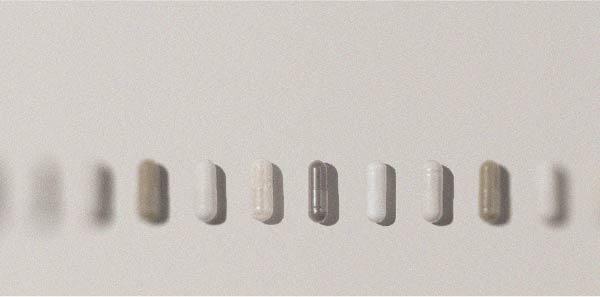Vegetarians: how to prevent deficiencies
Have you given up eating meat or are you planning to do so? Discover how to prevent deficiencies while following a vegetarian diet.

Vegetarianism: a few reminders
As we know, vegetarianism means abstaining from eating the flesh of animals: meat, fish, seafood … Currently, around 5% of the world’s population is vegetarian (1).
There are many reasons why people make this choice:
- compassion foranimals ;
- a desire to reduce their ecological footprint (livestock farming is responsible for up to 14.5% of human-induced greenhouse gas emissions) (2) ;
- a desire to protect their health (adopting a vegetarian diet may reduce the risk of cardiovascular disease or cancer) (3-4) ;
- culinary preference, etc.
But as with any diet, it’s best to be properly informed before you make the change – because when you give up meat and fish, you can quickly find yourself lacking in certain nutrients...
To ensure a good intake of proteins, opt for pulses and grains
Let’s remember that meat is a major source of proteins. These macromolecules are essential in order for the body to function properly, for muscle development and for immunity (5).
To avoid falling short on proteins, make sure you eat plenty of starchy foods which in a vegetarian diet means eating:
- dried vegetables (pulses) such as lentils, flageolet beans, kidney beans, black beans, broad beans, soya beans, chickpeas, split peas, dried peas ...
- and grains, such as rice, corn, wheat, spelt, barley, oats, sorghum, buckwheat, millet...
Ideally, try to combine both these types of starch in the same meal in order to maximise your protein intake. You could, for example, opt for:
- soya + rice
- kidney beans + corn
- lentils + wheat, etc.
This kind of combination will provide you with a good variety of amino acids. Pulses, for example, are a source of lysine, which is absent in grain proteins, while conversely, grains provide methionine which is missing from proteins in pulses.
The other major sources of protein: eggs, dairy products, seitan, almonds ...
Another way of ensuring an adequate protein intake is to include eggs in your diet, as both the white and the yolk are good sources of protein.
Dairy products such as milk, cheese and yogurt are also high in protein. Sports enthusiasts keen to gain muscle mass can also benefit from the significant protein content of whey, a by-product of cheesemaking (for example, Undenatured Whey Protein Isolate).
Other foods that contain a substantial level of protein include quinoa, tofu (bean curd), seitan, tempeh, almonds, mushrooms, whole wheat pasta, wholegrain rice, nuts, hemp seeds and chia seeds ...
Make sure too that you maintain your iron intake
Secondly, it’s important to ensure you get enough iron (especially women and children) (6). As we know, this important trace-element ensures the transport of oxygen in the blood. Fatigue, a general lack of energy and dizziness are all symptoms of a lack of iron.
Among the best sources of iron are red and white meat and seafood, but excellent vegetarian alternatives include pulses, dried fruit and oilseeds (sesame seeds, cashew nuts, almonds ...) (7).
There are also easily-absorbed iron supplements available which can help reduce the risk of anemia in vegetarians. The form iron bisglycinate is particularly well-tolerated by the body, and can be found, for example, in the supplement Iron Bisglycinate.
Note: do not take iron supplements unless you’re sure you’re deficient – ie, it has been confirmed by a blood test , as taking iron when you don’t need to has a pro-oxidant effect.
The famous vitamin B12 (cobalamin) deficiency
In addition, a meat-free diet can result in a lack of vitamin B12, or cobalamin, the one vitamin that is only found in animal-source foods.
While it’s true that B12 is found in eggs, milk and cheese, levels are much lower than those in meat, and vegetarians therefore face a genuine risk of deficiency (8).
And a lack of B12 has significant health implications: nerve, digestive and visual disorders, as well as severe fatigue … (9) To prevent such problems, take methylcobalamin, an active form of vitamin B12 and the best form for the body (try, for example, the supplement Methylcobalamine).
How can you obtain omega-3 when you don’t eat fish?
Non-vegetarians normally obtain omega-3 fatty acids from oily fish such as salmon and tuna. Good vegetarian alternatives include:
- ground linseed;
- nuts ;
- olive oil or rapeseed oil...
Vegetarians frequently lack zinc and iodine
Last but not least, a vegetarian diet can lead to:
- a lack of zinc. Zinc is an essential trace-element which is important for protein metabolism, immune defenses and skin and hair … (10) You can ensure a healthy level of zinc by consuming sesame seeds, sourdough bread, cocoa or dairy products. And if you want to guarantee an optimal intake, take a zinc supplement with good bioavailability (such as Zinc Orotate) ;
- a lack of iodine. According to one study, 25% of vegetarians and 80% of vegans are deficient in iodine (11). Yet this trace-element is very important because it ensures healthy thyroid function (which plays a crucial role in maintaining our bones, brains, and muscles …). If you’re lacking in iodine, there are natural supplements available such as Natural Iodine. Don’t hesitate to seek advice from your doctor on this subject.
Spirulina and maca, the perfect superfoods for vegetarians and vegans
There are certain natural, nutrient-rich substances which can significantly help you maintain nutritional balance.
We recommend in particular:
- spirulina. This blue-green algae is a source of proteins, iron, zinc and multiple vitamins. (12) And if you don’t like the strong taste of powdered spirulina, this super-food can also be consumed in tablet form in the supplement (Spirulina) ;
- maca. Indigenous to the mountainous regions of Peru, and recognized as a natural health tonic, this plant contains proteins, vitamins B1, B2, B12, C and D, calcium, zinc, iron, and potassium... (13) You’ll find it in the excellent supplement Super Maca.
3 comments about vegetarianism and veganism
- It goes without saying that vegetarians should follow all the usual dietary recommendations! Like non-vegetarians, they should try and eat 5 portions of fruit and vegetables a day and avoid high-fat and high-sugar foods.
- Following a vegan diet and way of life means excluding all products of animal origin, such as eggs, milk, etc. Vegans therefore need to be even more careful. In the case of calcium for example, the absence of dairy products from the diet means that vegans need to instead look to foods such as cabbage, spinach, pistachio nuts, and calcium-enriched plant milks.
- Women who are pregnant or who wish to breastfeed must be particularly careful about diet-induced deficiencies. If you fall into this category, we recommend you talk to your doctor who will potentially be able to advise you on suitable dietary supplements (14).
References
- Meat Atlas 2014. Monographie sur l’industrie et la consommation de la viande dans le monde. Consulté en Mars 2020.
- Food and Agriculture Organization of the United Nations, Tackling Climate Change Through Livestock, A global assessment of emissions and mitigation opportunities, Roma, 2013 http://www.fao.org/docrep/018/i3437e/i3437e.pdf
- Fraser GE. Vegetarian diets: what do we know of their effects on common chronic diseases? [published correction appears in Am J Clin Nutr. 2009 Jul;90(1):248]. Am J Clin Nutr. 2009;89(5):1607S‐1612S. doi:10.3945/ajcn.2009.26736K
- Dinu M, Abbate R, Gensini GF, Casini A, Sofi F. Vegetarian, vegan diets and multiple health outcomes: A systematic review with meta-analysis of observational studies. Crit Rev Food Sci Nutr. 2017;57(17):3640‐3649. doi:10.1080/10408398.2016.1138447
- Berg JM, Tymoczko JL, Stryer L. Biochemistry. 5th edition. New York: W H Freeman; 2002. Chapter 3, Protein Structure and Function. Available from: https://www.ncbi.nlm.nih.gov/books/NBK21177/
- Coad J, Pedley K. Iron deficiency and iron deficiency anemia in women. Scand J Clin Lab Invest Suppl. 2014;244:82‐89. doi:10.3109/00365513.2014.936694
- Messina M. Soy and Health Update: Evaluation of the Clinical and Epidemiologic Literature. Nutrients. 2016;8(12):754. Published 2016 Nov 24. doi:10.3390/nu8120754
- Rizzo G, Laganà AS, Rapisarda AM, et al. Vitamin B12 among Vegetarians: Status, Assessment and Supplementation. Nutrients. 2016;8(12):767. Published 2016 Nov 29. doi:10.3390/nu8120767
- Pawlak R, Lester SE, Babatunde T. The prevalence of cobalamin deficiency among vegetarians assessed by serum vitamin B12: a review of literature [published correction appears in Eur J Clin Nutr. 2016 Jul;70(7):866]. Eur J Clin Nutr. 2014;68(5):541‐548. doi:10.1038/ejcn.2014.46
- Roohani N, Hurrell R, Kelishadi R, Schulin R. Zinc and its importance for human health: An integrative review. J Res Med Sci. 2013;18(2):144‐157.
- Krajcovicová-Kudlácková M, Bucková K, Klimes I, Seboková E. Iodine deficiency in vegetarians and vegans. Ann Nutr Metab. 2003;47(5):183‐185. doi:10.1159/000070483
- Finamore A, Palmery M, Bensehaila S, Peluso I. Antioxidant, Immunomodulating, and Microbial-Modulating Activities of the Sustainable and Ecofriendly Spirulina. Oxid Med Cell Longev. 2017;2017:3247528. doi:10.1155/2017/3247528
- Gonzales GF. Ethnobiology and Ethnopharmacology of Lepidium meyenii (Maca), a Plant from the Peruvian Highlands. Evid Based Complement Alternat Med. 2012;2012:193496. doi:10.1155/2012/193496
- Sebastiani G, Herranz Barbero A, Borrás-Novell C, et al. The Effects of Vegetarian and Vegan Diet during Pregnancy on the Health of Mothers and Offspring. Nutrients. 2019;11(3):557. Published 2019 Mar 6. doi:10.3390/nu11030557
Keywords
1 Days
First bottle has been finished
First bottle has been finished. 2 bottles remaining for 3 month time frame trial as recommended
CORCORAN Pamela
6 Days
repeat customer
recommended by my doctor. easy to create an account. Discounts and specials are appreciated. packaging and delivery is dependable. Capsules easy to digest. I've had some some capsules and tablets that are broken inside their bottles.
Kokee
10 Days
Order was shipped on time and packaged…Wonderful Jobs!
Order was shipped on time and packaged excellently.
DMHoge
16 Days
great products and prices
great products and prices
Marie
22 Days
Easy to navigate site
Easy to navigate site, had what I was searching for, good price. easy order-check out
James Tucker
28 Days
My skin is clearing up nicely!
Pretty good for my skin so far.
Christian
30 Days
The new packaging is excellent
The new packaging is excellent - finally! No more squashed boxes and torn envelopes.
GORAN
31 Days
Great Product
Great Product
Larry Garrett
36 Days
Quick shipping
Quick shipping; good price. No issues!
Mary McCarty
37 Days
Thr product is very good and is helping…
Thr product is very good and is helping me on my health. Then is always on time
LUGO Luz
40 Days
Buying was fine
Buying was fine. I had problems with the website not recognizing my login info, and had to call to get it fixed. Other than that, everything was good.
David S. Clark
40 Days
Your super maca and super ginseng are…phenomenal
Your super maca and super ginseng are phenomenal supplements that compliment each other when taking them together. Fantastic feeling of well-being and lots of mid day energy without the crash.
Keith Mason
43 Days
I have had amazing results with every…
I have had amazing results with every supplement I've purchased. I am extremely satisfied with this company
kirstin Torres
43 Days
Fine products
Fine products . They are on the leading edge of online supplements. The only issue -so far-is they sometime run out of subscription items.
Jason Argos
45 Days
The ordering process is very user…
The ordering process is very user friendly and the products always come in a timely manner.
CARTER Rhonda




